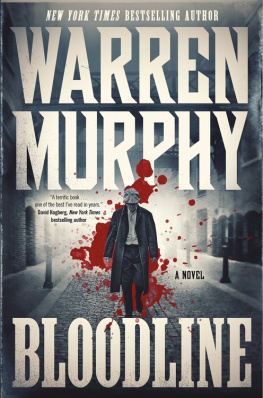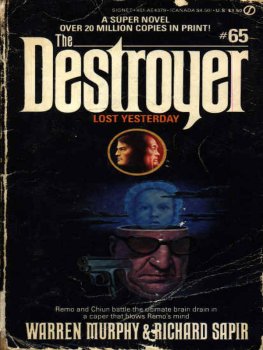Destroyer 104: Angry White Mailmen
By Warren Murphy and Richard Sapir
Chapter 1
He had a face, but no one could describe it afterward.
He had eyes in his face, but everyone remembered their color differently. His complexion had texture, but no one noticed it. Some remembered his hair as red, others as yellow and still others said it was brown.
What they did remember was his uniform. Everyone noticed the uniform. No one paid any attention to the man inside.
It was not that he blended in with the early-lunchtime crowd returning to the new Wiley Post Federal Building in Oklahoma City. A few people actually flinched involuntarily as he approached the stone steps. It was the uniform that made them flinch. Yet his face was benign, his carriage unthreatening.
But no one was looking at his face as he mounted the steps.
Later a few survivors thought it was strange that he wore earphones. They remembered it as strange because they thought there must be some regulation against listening to a Walkman while making one's appointed rounds.
The security guard at the metal detector looked up, saw the blue-gray uniform and not the man and, recognizing the uniform, waved the unfamiliar face around the metal-detector line, which was backed up to the stairs.
"You're late today," the guard called after him.
The uniformed man nodded curtly and passed through the primary line of defense unchallenged. No one questioned the uniform. It could be seen on virtually every street in the nation and while it was feared by some, it was respected by most Americans.
Stationed before the elevator, where he could scrutinize all unfamiliar faces, a lobby guard made eye contact and asked, "New guy?"
"Started today," the uniformed man said curtly.
The elevator arrived, its massive doors sliding apart.
"Well, take it easy," the lobby guard said.
"Uzi does it," the man called back. In the commotion of federal workers filing through the metal detector, his exact words registered only in retrospect. People hear what they want. Just as they see what they expect.
Stepping off on the sixth floor, the man with the eagles on his uniform-jacket shoulder patch looked both ways and saw a closed door with a sign that read, Court in Session. He strode toward it, one hand dipping into his capacious shoulder bag.
Another guard was on station at the door. He suddenly blocked the way, saying, "Sorry. No admittance. Court's in session."
The man extracted an envelope from the bag, saying, "Special delivery."
The guard frowned. The envelope was addressed to Judge Calvin Rathburn.
"Okay, but try not to call attention to yourself." He opened the door to let the man enter, holding it open so he could close it quietly afterward. Judge Rathburn ran a strict court.
Reaching into his big leather bag, the man stepped in. He suddenly pivoted, and the guard saw the stubby Uzi submachine pistol in the cold, frozen moment before it snarled hot and angry at his exposed stomach.
The uniformed man snarled, too. "Die, disbeliever!"
Crumpling to the floor, the guard watched the rest, helpless. He lived long enough to tell the authorities all he witnessed.
The man entered Judge Rathburn's court and immediately opened fire. Panicked screaming drowned out that first horrible burst. The guard recognized some of the voices. The cute stenographer he had the hots for. Lawyer Tate, who sounded as high-strung as a woman before his voice turned into a hideous gurgle. A persistent banging sounded ineffectually-the judge trying to call order in the abattoir that had become his court of law.
The gunman emptied clip after clip at random. The guard saw only one bloody slice of it from his vantage point on the floor. When Judge Rathburn's red, angry face turned to exploding blood pudding, the guard closed his eyes and, impotent with rage, shook and shook on the floor, unable to move his arms, helpless to draw his weapon.
In his ears, the screaming of the victims died as the gunman's raging voice lifted over the echoing din of gun thunder.
"Unbelievers! I drink in your disbelieving eyes! I rejoice in your misery. God is grape! He commands you to accept the deaf penalty meted out by his lawful messenger!"
No one answered. They were already beyond hearing, beyond caring.
"My God!" the guard muttered. "He's gone postal. Completely postal."
It was over in less than five minutes.
The guard sensed the gunman stepping over him, hard heels clicking down the marble hall. The ding of the elevator signaled his escape.
That was the final thing he remembered before the FBI started questioning him. It was the last clear memory he carried with him to the grave.
THE FBI WERE ON THE SCENE in less than ten minutes. They could have been there in five. Their local office was on the twentieth floor, but the new federal building had been constructed like a bunker. Bombproof. Bulletproof. Soundproof.
No one had heard the shooting and dying. Until the lunch crowd began filtering back to the sixth floor and the guard was discovered in a welter of his own blood, no one suspected anything violent had happened.
One look inside the half-open courtroom door changed all that.
By the time the FBI got organized and ordered the building sealed, it was far too late.
The faceless man in the respected uniform had quietly left the building and melted into the streets of Oklahoma City. No one would have thought to detain him anyway. No one would have dared search him or his big leather bag. He was inviolate.
For everyone understood his mission. And although a tragedy had occurred, he could not stop or be stopped.
Rain or shine, snowstorm or bloodbath, the mail had to go through.
Chapter 2
His name was Remo, and he had nothing against the Japanese.
He felt certain on this point, so he said it aloud. "I have nothing against the Japanese as a people or a race."
A squeaky voice hissed, "So you have forgotten Pearl Harbor?"
"Before my time," said Remo.
"What about the Bataan death march?"
"Same answer. That was an earlier generation."
"The dead cry out for retribution, and you say this?"
"Peace was declared fifty years ago. We're not at war anymore," Remo said reasonably.
"Then why did they send their vicious samurai to these shores intent upon slaughter and maiming?" asked the Master of Sinanju.
"For crying out loud, Chiun, you only lost a nail!"
"You who have no fingernails to speak of may say this. It is nothing to you to be deprived of a nail. You have never achieved correct nail length."
Remo had no answer for that. He sat on a round tatami mat in the bell-tower meditation room of his home. Remo was looking out a window. On the other side of the white-walled square room, the Master of Sinanju sat at the opposite window, also gazing out. They were supposed to be meditating. Instead, they were arguing.
The silence lasted long enough that Remo thought he was going to get some peace. As usual, he was wrong.
"And why am I forced to endure this interminable wait?" Chiun suddenly wailed. "Why am I forbidden to rend Japanese limb from limb?"
If there was a good answer to that, Remo didn't have it, so he kept quiet.
At length Chiun spoke in a more subdued squeak. "What about their hideous automobiles, which clog the streets of this land you love so well, filling the very air you breathe with their stench?" he asked.
"If people want to drive Japanese cars, that's their business."
"Have I not heard you refer to them as rice burners?"
"The cars, yes. The people, no."
"Reverse racist!" Chiun spit.
"I am not a reverse racist."
"You do not hate the Japanese as you should. Therefore, you are a reverse racist."
Next page



